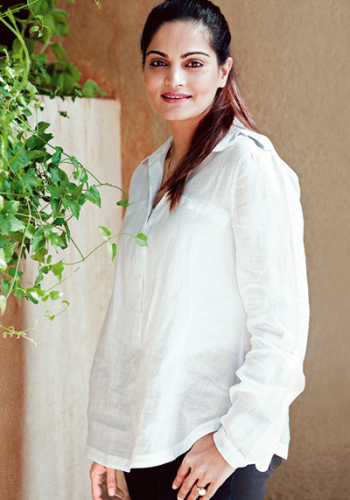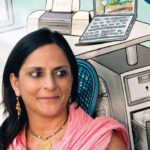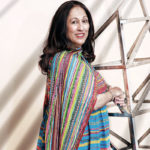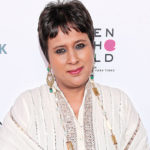- Home
- People
- Features
- Verve People
- The Other Sibling
The Other Sibling
Growing up with the likes of actor Salman Khan, media personality Barkha Dutt, and author Vikram Seth, their sisters – Alvira Agnihotri, Bahar Dutt and Aradhana Seth – are women driven by their own visions and passions. Verve meets the feisty trio….
 Alvira Agnihotri, Philanthropist
Alvira Agnihotri, Philanthropist Bahar Dutt, Conservationist
Bahar Dutt, Conservationist Aradhana Seth, Visual Artist
Aradhana Seth, Visual Artist
Alvira Agnihotri
Philanthropist
“It’s just a divine blessing”
She turned producer last year (with Bodyguard, which she and her husband, Atul, produced with Reliance Entertainment) and has been completely hands-on with Being Human since its inception. Yet, Alvira Agnihotri has deliberately stayed out of the limelight. In fact, when we catch her on a Saturday afternoon in her Bandra home, she is a little self-conscious about what she does – choosing to let the organisation and its work speak for itself. “I feel that there is really no need to talk about something like this. It’s just a divine blessing and it’s happening by itself,” she states.
Alvira has been involved with Being Human from the beginning. She emphasises through our conversation that “the Being Human concept is Salman’s. For the longest time he was doing stuff for people on his own and, when he realised that there is a lot more that we can do, the thought of starting something like a foundation or trust came up. It took us a couple of years to get it structured as it needed a lot of commitment.”
In real life, Salman is known for his giving nature, a trait that Alvira endorses without hesitation. “Salman is a very different person. For him if you give him something, even if it is for the foundation, he will want to give you back a hundred times more. Taking does not come easily to him,” she points out.
And that is why they came up with the idea of having a Being Human line of clothes and accessories. “We decided to do something where people are not obliged to donate for nothing,” she says. “We wanted to give the people something that they could use or wear.”
While dad Salim looks into the healthcare part, Alvira takes care of aspects like the brands, raising money and various aspects of the education field. “I would say,” she adds, “the whole family is involved because we all come up with ideas about how to generate more money – for instance, Sohail is likely to organise a football match.”
The star power provided by Salman is a bonus but the genuine aura around him attracts many more people by the day. On the innumerable heart-rending requests they get, particularly for treatment, Alvira says, “It is extremely difficult to deal with them dispassionately. We generally leave it to the doctors. There is too much pain, it’s very heartbreaking. You’re very scared thinking what if the patient doesn’t become okay – just because you are giving financial help does not mean all will be well. Every day we see such people and think there must be so many of them. Some of them manage to come to come to us and some of them don’t.”
Being Human – a simple phrase that depicts the feeling behind the whole charitable endeavour. Alvira says the term came about simply. “Many people were throwing names around and one fine day Salman just came up with this one. He called me and said, ‘Listen I’ve got a name, Being Human.’ And I said, ‘Fantastic’. He told me not to go to a design house but to ask the children to do something. So I called all the kids, my sons and their friends and asked them to do something with Being Human. They came up with nice ones but the final logo was the nicest. It just worked.”
On the healthcare side, Being Human has tie-ups with many doctors and hospitals – Tata Memorial being one of them. Though initially focussing on cancer, heart problems and children, it slowly increased its focus. Alvira emphasises, “Salman believes that as long as it changes the quality of someone’s life, it should be done. We try not to deny anybody who has a genuine request. And we never give money to individuals. We give money to the NGO, or to the school or to the doctors and hospitals where the person is going to be.” As for moving into education, Alvira is clear that Being Human is not thinking of starting its own venture, “but is looking at tie-ups with well established firms – organisations like Aseema. We’re also looking at other options.”
This year, under her supervision, there is an association with a clothes brand – for men and women – in the pipeline. Looking ahead, she points out, “It’s launching soon in April in India. We will actually launch in Europe and U.A.E before India. We tied up with somebody who has existing stores there. Here it is taking a lot of time to set up. So, we first launch in France. Along with this, there are plans to start a café and an association with Rotomac for pens. All this is still done from Galaxy Apartments, Bandra, where it all started.”
Bahar Dutt
Conservationist
“I still have some stories to tell”
Her love for wildlife has driven her to walk in the wilds. Catch her on an afternoon break in a coffee shop in New Delhi’s Hauz Khas Village and it is easy to understand why Bahar Dutt, environment editor, CNN-IBN/Network 18, is as comfortable before the camera as her elder sister, media personality Barkha Dutt. Bahar puts it differently though: “I don’t feel nervous facing the camera, only because I know my subject and there’s an urgency with which I report on wildlife issues. I speak from the heart, but also base what I am saying on science because I studied conservation biology.”
She grew up nurturing a love for animals. Rewinding to her largely city-centric upbringing where she always conspired to get closer to them, she says, “I had no Gerald Durrell moments. But I watched Jacques Cousteau’s documentaries on my dad’s (S P Dutt) lap in New York City when we were living there, fascinated by the underwater world – it all looked so cold and blue and overwhelming. When we returned to India, I kept picking up all the puppies and kittens from the street and bringing them home as pets – there was a constant tussle with my mother over this.”
Her work life over the last ten years has been a treasury of golden moments that has affirmed that this is where she wants to be – “watching the elephants at the edge of a watering hole under a fiery African sunset, tracking a herd of wild ass in the Rann of Kutch, or more recently getting up close with a tiny bright orange coloured frog in my hands in the forests of the Western ghats.”
Bahar did find her initiation into the world of television difficult because “I wasn’t professionally trained in the medium. And wildlife conservation is very tough in the real world. It’s not just about ‘saving the planet’; it’s a far more complex exercise, especially in our country where over 200 million people live off the forest.”
She has her task at CNN-IBN cut out for her. “That is because,” she states, “I wanted our reporting to go beyond the ‘cute cuddly animals’. So, when I joined the channel I told our editor, Rajdeep Sardesai, that I didn’t want ‘environment’ to be in the features space. I would get him stories on the quiet illegal sell-out of India’s forests and wilderness areas in blatant violation of environment laws. I wanted to bring environment journalism into the domain of hard news. It feels good to know at the end of six years in the channel that environment is today a mainstream beat.”
Her mother – also a journalist – died at a young age. Prabha Dutt’s stories and Barkha’s achievements are a tough act to follow. She states, “I hope we are even half as tough as my mother was. My dad constantly scolds us even now that we (Barkha and I) don’t work as hard as our mother! My sister brought me up in so many ways and she is fiercely protective about me. We don’t have that kind of relationship where I need to discuss my day with her every day. We all meet at my dad’s house – we are a big family of cousins and aunts all living close to each other, so it’s like one joint family under several roofs.”
On being Barkha Dutt’s younger sister, Bahar is clear that “though I am proud to be my sister’s sister, I did always have this strong urge that I must have my own identity. I hated comparisons with her; I disliked it when my teachers at school expected me to be good at debating just because she was. I had my own set of interests. That’s why even when I joined journalism I never dropped her name anywhere. I walked into media houses on my own; I didn’t want anyone giving me a job because of the family name.”
Temperamentally the two girls are different. For, as Bahar underlines, “I am not as aggressive as my sister at all, I was the quintessential quiet child who got bullied in school – that’s why I think my sister worries a great deal for me.”
For Bahar, journalism came later, much after her foray into wildlife conservation. “I wanted to tread a different path. I am glad I did that, otherwise people would have said I had it easy, that I just used my sister’s name,” she says. “I know I didn’t and I feel proud of that. It also helped that I spent so many years in the field in conservation and then came to journalism. I keep telling myself I am first a conservationist and then a journalist.”
Married to Vijay Bedi, wildlife film-maker, Bahar is looking forward to doing more than television in the future. “’What next?’ is a constant question in my life,” she states. “I am currently finishing my book which encapsulates the current ecological crisis in India and my experience of having travelled to some of India’s most precious wilderness areas, the magical moments of having seen endangered animals in the wild. I have enjoyed my stint in television immensely; I still have some stories to tell. The day I feel I have run out of those stories I will quit TV. I also want to go back to conservation, give ‘back to nature’, perhaps start my own community conservation project or join an NGO. I know it won’t be difficult as that’s what I used to do before TV.”
Aradhana Seth
Visual Artist
“It was a beautiful household to grow up in”
She dons her several caps with ease as she switches from being film-maker, writer, artist, set designer, a woman who often has a room inside her head, and frequently combines two or more roles. Though like her award-winning brother Vikram Seth, her mind is always brimming with ideas, unlike him, Aradhana Seth, is a pre-eminently visual person.
Hailing from an illustrious family – her mother Leila Seth was an eminent legal personality and judge, Delhi High Court – Aradhana’s work is driven by her unique creative sensibilities – a vision that ranges over a spectrum of mediums. For as she has said, “I don’t feel that if you are a writer you are not an architect. My creativity is all connected. I often work in different mediums simultaneously even though I am a bit serially monogamous. I may work on one at a stretch – sometimes it is film, at others metal and at still others print.”
Aradhana has lived in many cities. Born in Patna, Bihar, she grew up in Kolkata with two elder brothers – Shantam and Vikram. She is quite at home in her different abodes – and has, in fact, created her own spaces in both her Goa and New Delhi homes. The latter is located very close to the Seth farmhouse in Mehrauli.
Her parents and brothers played an important role in shaping her sensibility. “It was a beautiful household to grow up in,” she rewinds. “My father took us to Indian classical concerts, my mother to Western classical concerts. All three of us have a little bit of them in us along with elements of our selves.”
Much younger than her brothers, the bonds between them grew stronger when they were all adults. For as Aradhana points out, “It was only years later that Vikram and I really became friends. There is a ten year gap between us. When you are younger, the age difference seems much more and so one does not interact that much.”
About Vikram, she says, “He studied at Doon and was away for a chunk of my growing up years. When he returned for holidays it was always special. He read to me; he would make drawings for me and he also introduced me to the joys of poetry.”
Though he grew up to be a ‘suitable boy’ in the world of literature, relationships at home remained the same familial well-knit ties. She says, “We are very close now. We discuss our emotional lives with each other. Once when I was working on a film, we were living in the house together. I would come home from the shoot, late at night or early in the morning, and to unwind I would put on some music. While I would be listening to Schubert in the early hours of the morning, he would be waking up to do his work. Once I even came home with some chickens!”
Aradhana often shows her work to her family, if they are around. “Vikram has seen my photographs as have my parents. But I have not specifically shown my work to them for their opinion. It is often ready by the time I show it,” she points out.
With Vikram, like with the rest of the family, it is more a case of sharing thoughts. “If I make a film, I may have a discussion related to the law with my mother. I may share some script with Vikram. We share ideas – sometimes over the dinner table and sometimes not at all!”
Verve Trending
Sorry. No data so far.
us on Facebook to stay updated with the latest trends





